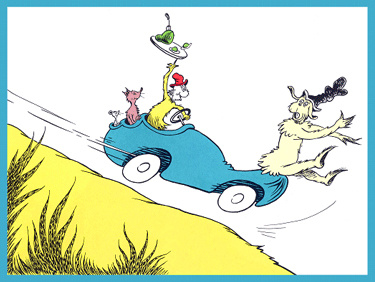
by bsquared5@aol.com | Sep 9, 2015 | Thoughts
My husband’s grandfather once held a job as an ambulance driver. This was back in the day when the nearest hospital was about an hour away and the town’s local ambulance also served as its Hearse, depending on the timing of the situation. Regularly, he would drive 100 mph on the interstate, sirens wailing. While he eventually gave up the ambulance gig, he still drove as if the sirens howled atop his Cavalier, well into his 80’s. I’m blaming my son’s driving on him. Kind of. Not really.
One by one, my father taught all five of us how to drive. We each learned the pedal coordination of a manual transmission. I was not allowed behind the wheel until I could successfully change a tire, find the hazard lights, and check the oil. He was calm but firm in his manner, frequently making acronyms out of instructions so they’d be easy to remember. TSBB = turn signal before brake. LOWR = lights on when raining. Everything’s an acronym in the military. “Be defensive,” he’d say. “You gotta watch out for Isadore Idiot.”
I can’t for the life of me figure out how he made it through five fledgling drivers without hard liquor, medication, or some unfortunate facial tics. Three years ago, our firstborn got her license. For the most part, teaching her went well. There was that time she drove our van down a shoulder-less road, steep ditches dropping on either side. For the next two days I couldn’t figure out why my right arm was so sore before it dawned on me that I’d been gripping the door handle, trying from the passenger seat to single handedly pull a 2000 pound vehicle away from the dropoff as it sped down the road.
The first time she merged onto an interstate, we were neck and neck with a semi, quickly running out of lane. My normally unflappable husband sat in the back seat behind her, a giant tire spinning beside his window, hoarsely screaming, “WE’RE NOT GONNA MAKE IT!” as my son obliviously played video games beside him. Once we finally merged, he directed her to immediately get off at the next exit and pull over, muttering under his breath that we’d almost wiped out the entire Blaylock line with that maneuver. Despite this, the daughter’s license was not so hair-raising for me.
The son, Fifteen, is another matter. I reasoned that all those years of riding tractors with his Papaw, zipping around on ATVs at the farm, and the superior hand-eye coordination he no doubt has developed from incessant video games should make this a walk in the park. True, if that park is Jurassic and there are velociraptors in the bushes.
Am I a perfect driver? No I am not. My record has some blemishes. A ticket here, a fender bender there. People often share knowing glances and accuse me of “making good time” on road trips. Still, passengers generally do not grip the armrests and pray out loud when riding with me.
I think it’s his demeanor. He is bright, happy, casual, and possesses no fear. Also, lately, he has decided to like the Electronica station on the radio. If you’re not familiar, this music–and I use the term loosely–is mostly repetitive synthesized beats that gradually ratchet up in intensity until you reach a “drop,” which you can tell by the seizure-inducing bass and change in tempo. He claims this music helps him concentrate. I claim it gives me an aneurysm.
Also, it could be that, while driving, he blithely poses curious questions that do not give me warm fuzzies. Such as: do you think you can you drive a car down the road backwards as fast as you can drive it forwards? Have you ever just pressed the gas all the way to the floor to how far the speedometer would go? These questions give me feelings similar to ones you might feel if your kid were to casually ask, “What, do you think, would be the fastest way to poison your parents where no one would ever know?” That is, suspicion and the slightest nudge of discomfort.
The other day, I agreed to let him drive around town to do some errands. It was not my finest hour. After about 45 minutes of my wise counsel and fielding comments like, “Well, that’s not how dad says I should do it,” I had one very small sinuous nerve left, and he was on it. We were sitting at a stop sign, the Electronica music was reaching an intense moment (if he’s going to play it on his own, he may as well play it while practicing), and the car in front of us moved through the intersection. He stepped on the gas to follow as if a red light had just changed to green.
As I looked to the left to see the oncoming car through the intersection, my brain raced with synonyms for the word “STOP,” but apparently decided that none of them were sufficient. I swung my left arm across his chest to somehow shield him from all harm, and instead, from somewhere in the depth of my terrified being, my brain accessed another, shall we say, less appropriate word, also containing four letters. This word, the mother of all of the worst words, clawed its way from my gut through my lips as I screamed. Turns out, hearing your mother yell this less than a foot away will also mercifully cause you to stop a vehicle.
I don’t remember my mother ever giving a single driving lesson. Maybe somewhere along the way, after repeated visions of her offspring in twisted heaps of metal, she no longer wanted to ride the roller coaster of near-death terror and the adrenaline depleted catatonia that follows. It’s just better not to know.
Hours later, once I could breathe normally again, it occurred to me that we are all student drivers of sorts. We climb behind the wheel giddy and eager for the freedom of the open road, when we can barely stay in our lane. We are cocksure and casual, leaning our elbows out the open window with an arrogant finger barely brushing the wheel. After about a month, surely well-seasoned by now, we discover the horn and its easy contempt for others. How often do I know better, thinking the road signs are merely suggestions rather than protection for myself and everyone else? How often do I sarcastically point out, “Well, that’s not how they said to do it?” Music loud and attention elsewhere, it’s easy to disregard the voice offering counsel from the passenger seat. I’ve surely given Jesus some aching arms from trying to pull me away from the ditches.
After our silent ride home that day, I apologized profusely and banned myself from further driving lessons. His father will have to press on from here, while I lock myself in the bathroom and suck on some soap.
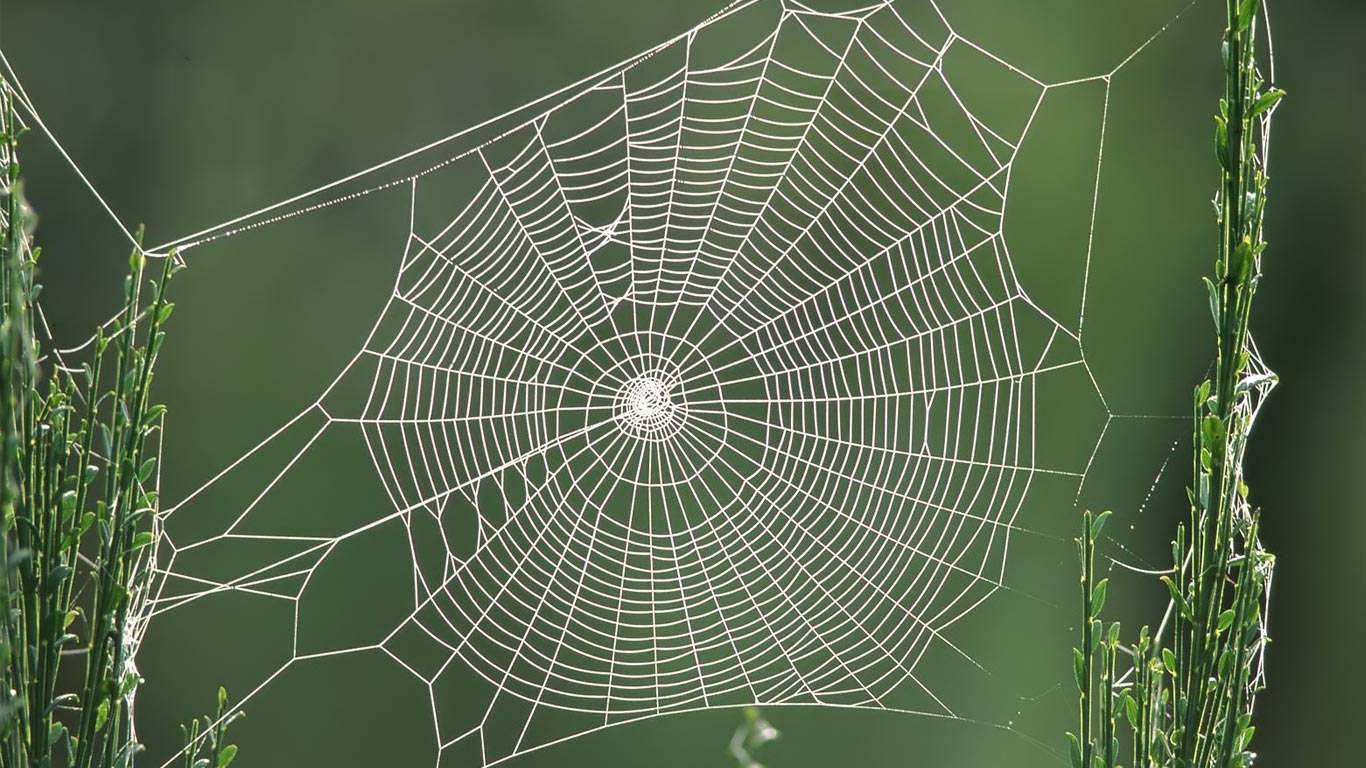
by bsquared5@aol.com | Aug 30, 2015 | Thoughts
Three days in a row, I have skipped out to the barn to feed the chickens and make sure the horse gets his carrot, and there, at the end of the barn, attached to the gate, I have run into a spider web spanning the entire barn aisle. Three days in a row, I have shrieked, flailed, and desperately smacked my clothing and whipped my hair, hoping to dislodge the eight-legged villainous insect that was probably creeping down my collar to bite me in the spine.
The first day, I was horrified. The second day, I was horrified and a bit annoyed that the giant web had been reconstructed. By the third day, I was horrified, annoyed at the spider, and kicking myself for my lack of memory. But today! Today I was prepared and armed with a rolled up newspaper, my sword which I brandished as I took halting steps towards the gate exit. And of course, today the spiderweb was gone. Apparently the spider was just as annoyed with me as I was with it and chose to relocate.
Anyone watching would have thought I’d gone mad. Step. Wave newspaper wildly in front of me. Step. Wave paper to the left and above head. Step, duck down. Wave paper to the right, squinting up into the shadowed corners. Those silky filaments can be so transparent in the right light. (I could take this as an indication that I might need glasses, but just yet I refuse to submit to the beckoning crook of Age’s finger.)
But anyone watching would not have known about the first two days I’d spent picking dead flies out of my hair. Or the time I went out to the back deck to water the plants and found a suspiciously large lump in the middle of an enormous spiderweb between the roof and deck railings. Curious, I inspected and was heartbroken to find the thin thread of a hummingbird’s beak poking out from its sticky cocoon. A terrorist spider was preying on the most innocent and fragile of creatures! After angrily ripping down its web, I lay awake at night thinking about how big a spider would have to be to eat an entire bird.
So that’s the thing. We all have our particular spiderwebs, things we’ve encountered and  hit head on that make us flail around like maniacs on occasion. Our reaction to our spiderwebs might make those walking along beside us look at us with concern. They can’t feel the gossamer threads; they aren’t imagining the bird-eating spiders.
hit head on that make us flail around like maniacs on occasion. Our reaction to our spiderwebs might make those walking along beside us look at us with concern. They can’t feel the gossamer threads; they aren’t imagining the bird-eating spiders.
One of the great gifts of this messy, crooked, scratch-and-dent life we get to live is the privilege of showing up for each other. What a wonder if we can look at someone swatting and ducking at their personal spiderwebs and, even though invisible to us, we can come alongside and nod knowingly, yeah, me, too. Me, too. Next time it will be us, when life is swell and we’re whistling along, when we run right out into life’s traffic and freeze as the proverbial bus bears down.
When my children were very small, occasionally their imaginations would invent scary things in the night that would make sleep impossible. After songs and water and reassurances, the one thing that would usually get them to sleep was Angel Wings. I’d spread one of their blankets out underneath them and they’d lie in the middle. As I folded and tucked each side of the blanket around them, I’d tell them these were angel wings protecting them from all the Scaries.
The monsters under the bed when we are children morph into nasty spiderwebs when when we are grown. We call it being practical or being a realist and give it nice names, making it into a pet that slinks around our ankles with a sly grin, when really we are just getting cozy with fear. Instead of trying something new, heeding an inward call, taking a risk on ourselves, our talents, or our heart’s desires, we hang back, convinced there might be spiderwebs ahead, convinced that we will not have what it takes to brush them aside.
Too often, we go through life running from something that isn’t after us.
Ghosts. Spiderwebs hanging tattered and dusty, the spider long gone. All that hair-whipping and arm waving wasted energy because the spider had moved on long ago. We only imagined its sticky threads wrapping us in the snare of its cocoon, when all along we had been free to run and dance.
I hardly ever read comments on internet posts. I’m usually stunned by the hatred and nastiness people seem to take pleasure in at others’ expense. Don’t b e someone else’s spiderweb. Don’t make the comment that plants a seed of fear and ugly. Don’t voice the judgement that says very little about the person you speak of and volumes about you.
e someone else’s spiderweb. Don’t make the comment that plants a seed of fear and ugly. Don’t voice the judgement that says very little about the person you speak of and volumes about you.
We can all be someone else’s angel wings, wrapping each other in grace. We can all be a hand to hold, sweepers of spiderwebs, real and imagined. Is there anything sweeter? As George Eliot said, “What do we live for, if it is not to make life less difficult for each other?”
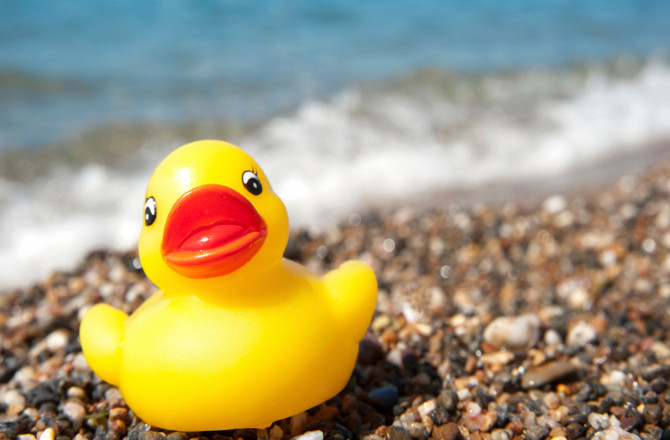
by bsquared5@aol.com | Mar 31, 2015 | Thoughts
Lots of people I know like to go to the beach but won’t get in the ocean. Things with teeth live there where you can’t see them, they say. Or things that sting or pinch. The undertow, the waves, the rocks beneath the breakers. All true.
I was in the ocean in North Florida with my brother one time when he scooped up a harmless clump of floating seaweed and proceeded to shake it. Out came a handful of living creatures that had been hitching a ride—tiny crabs, translucent shrimp, and unnamed life that quickly swam away. I was stunned and a bit startled. Who knew?
There’s a lot out there in the vast blue camouflaged as simple ocean. One of my sisters used to collect beach glass, storing it for some unknown purpose in jars in her bedroom. The misty shards of green, blue, and brown had been tumbled, tossed, and polished by the sea for who knows how long before her long fingers plucked them from the sand where they’d washed up amid the crush of shells.
Every year in the world’s oceans thousands of accidental container spills occur from rogue waves or storms that hit cargo ships. As a result, beachcombers have run across some odd items that have washed ashore: thousands of bags of Doritos, Nike shoes, unripe bananas, rubber ducks. Not to mention the unique and haunting debris that is still washing up on beaches from the tsunami that swept over Japan in 2011.
These things, like the living villages of seaweed, are out there just following the currents, sometimes for years, before they’re deposited on a stretch of sand somewhere. I’m fascinated by movies about people drifting at sea like Unbroken, Life of Pi, or Castaway. Out there on the infinity of ocean, wouldn’t it be surreal to feel your trailing hand bump something in the water only to find that it’s a drifting flock of hundreds of yellow rubber ducks?
I’ve been trying to take a more positive outlook lately and focus on the gifts that arrive at my shore unbidden instead of the things I suspect are lurking under the waves. Children are always good teachers in this respect. For them, everything is a gift, a joy to be explored. Even the weird purple jellyfish quivering at the water’s edge or the battered driftwood and crushed shells (these make lovely sand castle decorations).
Yes, there are Things With Teeth out there. But there are also starfish and sand dollars and bioluminescent plankton that sets the sea aglow at night. It’s so easy, habit, instinct to focus on the shelf of rocks under the waves, the undertow that some days seems to relentlessly drag me under. But then fear wins.
This year I’m determined not to let fear win. It’s such a niggling little parasite, sucking the joy and life from the best moments, and it doesn’t deserve my attention. Especially when, look, there are so many gifts, if I’d just see, washing up on shore to be treasured.
At the beach this week, I watch these small children play and laugh. They chase the seagulls because no one has told them they can’t be caught. They built castle after castle in the sand because no one has told them they will be washed away by morning, and the joy was in the building anyway, not the permanence. They shriek and dance, running from the cold waves onto the safety of shore, but before the day is out, they will always, always be waist-deep in the water, no longer afraid of the rush or crash. When did I decide I would give in to fear? Was there a single moment, a mark-able before and after? More likely a long, steady neglect of the tide’s treasures and a gradual habit of tired defeatism.
Many of us carry around the weight of fear like a slimy fish freshly caught, slapping against our legs as we walk, causing our steps to falter. Fear of letting go. Fear of opening your heart to love. Fear of doing that thing you’ve always wanted to do. Fear of stepping out in faith. Fear of forgiving someone and losing the kernel of resentment and anger you’ve held onto. The reasonable thing to do would be to toss that fish on the bank and leave it lying, flopping and gasping for air. Because we’ve carried it so long and so faithfully, it somehow seems cruel to cast it aside.
Finding Nemo is one of my favorite movies. There’s a scene where, in their search for his son, Marlin and Dory are stuck inside a whale. The water is going down and, as far as they know, they are in danger of being swallowed. Dory tells Marlin to let go. It seems like the right thing to do. Marlin, fearful from the start of the movie, screams, “How do you know something bad won’t happen?” Dory replies simply, “I don’t,” and then she lets go and slides down the whale’s gullet.
We are never guaranteed freedom from bad things, things with teeth. But if we never let go, if we never toss aside that slimy fish, we are most definitely guaranteed freedom from discovery, joy, and the treasures that wash ashore.
Thanks for reading! To return to the FICTION WRITERS BLOG HOP on Julie Valerie’s website, click Here
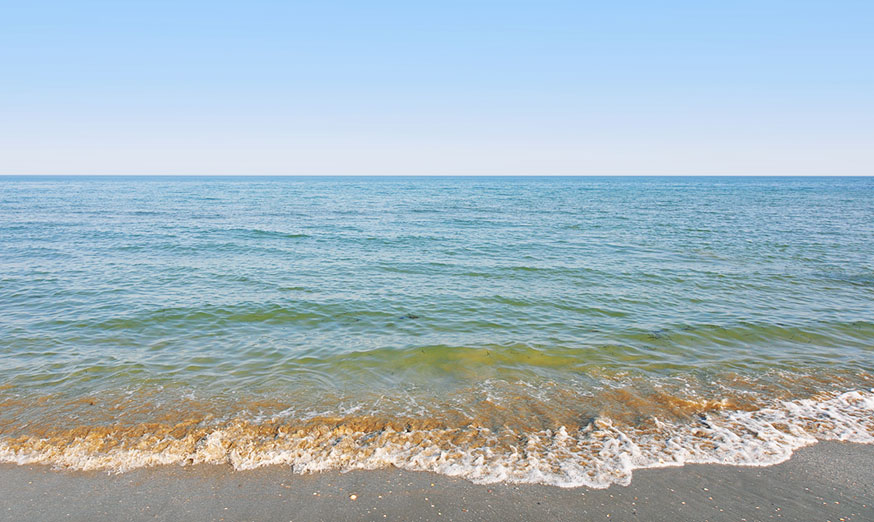
by bsquared5@aol.com | Mar 23, 2015 | Thoughts
I’ve been watching the tides at the beach this week, the relentless ebb and flow onto the shelly, sandy shore (say THAT three times, fast). When you’re lazing on the sand, propped up with a book and cold drink, the sea’s rhythm soothes and caresses like a mama with a sick child. There, there, my love, close your eyes and rest and you’ll feel all better soon.
It’s a different story if you’re out beyond the breakers. Despite growing up at the beach, spending a great deal of life in Florida, and having a house with a pool, my mother could not swim. I’m not sure just how she missed out on this life skill, especially given her environment, but there it is. She splashed in the shallows with all of us as children and made sure we could dive and swim with confidence, but she refused to even put her face in the water. She hid it well. I was not even aware of this lapse in her skillset until I was much older. I thought she was joking. “But I’ve seen you in the water,” I said. “You swim.” She shook her head. “I only pretend.”
After I graduated college, my mother and I went on a celebratory cruise, just us. As we island hopped around the Caribbean for several days, we were surrounded by water. She watched from the deck, sipping rum, as I swung off the pirate ship’s rope swing into the clear, blue sea. She watched from the shore while I splashed in the waves on horseback. Towards the end of our trip, we motored out to a small island off the coast of St. Maarten where our group was to spend the afternoon snorkeling over a reef. As the guide handed out fins and masks, he talked about the types of fishes we would see and the areas we should stay in. I was surprised when my mother started putting on the gear.
“I think I can do this,” she said. “It’s not that far off the shore, and I’ll have flippers.” Thrilled, I waded with her into the ocean and we practiced breathing through our snorkels and swimming around where we could still touch. Her face lit up when she spotted the schools of colorful tropical fish darting around the rocks. She pointed them out, gesturing wordlessly as our fins flapped.
The reef we were headed to was not that far, maybe a hundred yards or so. We floated on top of the ocean, bobbing with the waves, parallel to each other as we kicked our fins. It only took about ten minutes before we reached the rocky reef, but by the time we got there, the mood had changed. I noticed she was no longer eagerly searching for bright yellow schools of fish. I raised my head and treaded water, yelling to her where she sat like a nervous mermaid on top of the reef itself, something we weren’t supposed to do. She had yanked off her mask and was breathing hard.
“What? Are you done already?”
Then, for the first time in my life, I realized my mother was afraid. The whole way out we had been swimming against the tide, having to work for every bit of ground gained. The wonder and expectation of the reef had vanished. I had no idea how she’d even gotten on top of the reef at all given its rough surface, but she was there now, clutching the rock desperately. I’d seen her fearful for her children before, especially my brother who seemed to take special delight in racking up ER visits, but never for herself. Until that moment, to me she had been “mom,” the ever-present comforter and provider, who always knew what to do and how to fix it. Suddenly, in a few moments of offshore panic, she had become a person with limitations and fears.
I reasoned with her, the parent-child table turning in disorientation. “We are going to have to get back somehow. You can’t just stay out here.” She didn’t want me to alert the guide and call attention to herself, as if she wasn’t noticeable perched on top of the reef instead of snorkeling around it like everyone else. “I’ll help you,” I said. “You can hold on to me the whole way.” She reluctantly climbed off the rock, put her mask back on and let me swim her back to the shore. When she could touch bottom again, she was angry at herself. The swim back had been much easier, since we’d been going with the tide instead of against it. She admitted it was silly not to have snorkeled around the reef while she was out there. If she’d known it would be so much easier getting back, she wouldn’t have been afraid.
I offered to take her back out but she refused. She waded out and sat on the sand, afraid to try again. It’s one of the moments I remember most from our trip, being startled that my parents were real people in addition to being just my parents. You know, that normal 20’s smack in the head that most of us experience once we’ve outgrown our childish me-centric worldview. I kind of wish I’d had some easing into it, though, because it was truly a shock to my system that affected the remainder of that trip.
Why do parents try so hard to seem infallible to their children? Does it mean we love them more? Can protect them better? Do our words carry more weight? I don’t know any parent who’s played the “I’m perfect” card who is thereby more revered by their children. In fact, it’s mostly just the opposite. When we can be real to our children, confess that we don’t know something, we’ve messed up, we’re imperfect and have character flaws that we’re working on, our kids may just respond with more compassion and forgiveness than we knew they had. Have you ever told your child “I’m sorry, I was wrong”?
We think our children will hold us hostage when we admit truths about ourselves, but the reality is their respect for us grows. If they see us apologizing and working on our faults, it’s more likely they’ll do the same. If we can be humble and ask forgiveness from them, they might surprise us by how bottomless their little compassionate hearts are.
If, when they’re old enough, we can even let them hold us accountable on a thing or two, as an actual real person would with another actual real person, then we’ve really made some strides in the relationship.
I wish I’d fully appreciated my parents earlier. I’d probably have given them a break more, asked different questions, learned different lessons. But, like my mother, I was often content to stick with things the way they were, never imagining what was beneath the surface. I think we both learned something that afternoon. Sometimes the work it takes to swim against the tide rewards you in ways you never would have discovered had you just sat upon the shore.
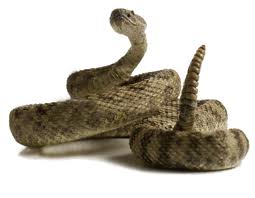
by bsquared5@aol.com | Jan 4, 2015 | Thoughts
Unbeknownst to my parents, my brother once kept a rattlesnake in an aquarium upstairs in our house. It was housed right next to its friend the moccasin in another aquarium, a duplex of sorts. He’d captured them in the state park across the street from our home, as a testament to his “snake whisperer” ways, and to prove to the park ranger who ran the nature exhibit that they did, in fact, appear locally. They lived upstairs in harmony for about two weeks until my mother discovered she’d been sharing her dwelling with two reptiles that harbored poisonous venom in their fangs. I’ll leave it to you to imagine the tirade that ensued before their eviction.
The moccasin was aggressive. It would actually come towards the glass if you approached, like: bring it, bro, you want a piece of me? Snakes are all muscle and can easily lift a mesh aquarium top with their bodies. Some friends of ours used to own a pet store, and they discovered this the hard way when a snake “went missing.” It was found a day or so later wrapped up nicely with the vacuum cleaner cord, clever camouflage until it was time to tidy up the store. (You’re going to think twice before you pull out your vacuum next time, aren’t you?)
The rattlesnake was shy and preferred to stay hidden. Tapping on the glass or sometimes even footsteps coming up the stairs were enough to start the ominous rattles shaking, warning off the intruder. I don’t want to fight you, but I will if I have to, they implied.
In college, my roommate Cindy and I were on a retreat one weekend in the Smokies. We went hiking with a large group but eventually got so far behind that we found ourselves alone at a fork in the path. Murphy’s Law: we took the wrong fork and were lost for a couple of hours, winding around in the woods until we came to a rocky overhang. We were talking and laughing, paying little attention to our surroundings, until I almost stepped on a rattler, coiled up like a spring in the middle of the path. We did a high-stepping snake dance, screaming in stereo and jumping into the brush. Giving him a wide berth, we edged along the rocks until we could pass safely. Of course, because we had been going the wrong way, we had to go back by him again once we realized how to get back to civilization. At the time, I didn’t care that the snake was shy and panicked. Every nerve in my body screamed “run away!”
It’s no coincidence that when I was between the ages of 12 and 15, my father came up with an endearing nickname for me. Princess? Sweetheart? Lovey? Nope. Rattlesnake. If you’ve ever actually had contact with a teenage girl around this age, you will totally understand. Moody and preferring isolation, my “rattles” sounded all the time. Leave me alone. Get lost. I don’t want to fight you, but I will if I have to. And if you poked too much, the venom would spray.
It was such an apt nickname, better than he knew. All my rattles and venom were defensive, spring-loaded for anyone who dared to get too close, a knee-jerk reaction to all those raging hormones. (Side note: do hormones ever do anything besides rage? I picture them in a loud, torch-carrying mob, storming the castle in the night.) It was all bluster. Just a front for whatever fear, anger, anxiety, or sadness I felt at the time. For some reason it all came out as fangs and rattles, and my family gave me a wide berth.
Fitting that I had to navigate this same wilderness with my own daughter at these ages. My mother always said I’d have a child just like me. After an attempt at conversation with her once, my father, as adept at nicknames as Sawyer on L*O*S*T*, dubbed her “Scratchy Cat.” Perfect.
Although I’ve outgrown the nickname, still there are times when I’m tired or emotional, and in the back of my head I detect a faint sound of maracas. My dear husband might say the sound is more than just faint. REO Speedwagon has a song with the lines
You played dead
But you never bled
Instead you lay still in the grass
All coiled up and hissing.
Despite that, the singer says he’s “gonna keep on loving you.” That’s all we misunderstood rattlesnakes need, really. Someone to see through the scales and hiss to the person with feelings underneath. Thankfully, I’ve had friends and family brave and kind enough to quash their tendency to scream and run. I’m a little more understanding to those quick to rattle and spit because more often than not it’s all smoke screen.
In any case, if somewhere down the road I completely change my image and become a leather and chains biker babe, I’ve got my name all picked out. Just call me Viper.




 e someone else’s spiderweb. Don’t make the comment that plants a seed of fear and ugly. Don’t voice the judgement that says very little about the person you speak of and volumes about you.
e someone else’s spiderweb. Don’t make the comment that plants a seed of fear and ugly. Don’t voice the judgement that says very little about the person you speak of and volumes about you.

